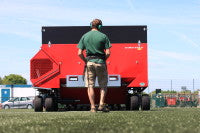Technical Surfaces do the double at Bolton Wanderers
 This month, Technical Surfaces was called in to refurbish the 3rd Generation artificial sports pitch at the Bolton Wanderers Eddie Davies Football Academy. The dual processes of Decompaction and topping-up of the pitch's rubber infill has helped to restore the playing qualities of the surface, as well as safeguarding its projected life expectancy and protecting the Premier League club's initial investment.
This month, Technical Surfaces was called in to refurbish the 3rd Generation artificial sports pitch at the Bolton Wanderers Eddie Davies Football Academy. The dual processes of Decompaction and topping-up of the pitch's rubber infill has helped to restore the playing qualities of the surface, as well as safeguarding its projected life expectancy and protecting the Premier League club's initial investment.
These specialist processes have already proved popular with the club, who have ordered this combination of works in both 2009 and 2010 to supplement their own in-house efforts.
"We have continued to work in consultation with specialists Technical Surfaces since the pitch was first installed in 2007," commented Richard Norton, Grounds Manager at Bolton Wanderers FC. "We were keen to get Technical Surfaces involved from day one to ensure that the correct maintenance programme was being carried out on the new pitch and have been extremely impressed by their overall level of work and service.
Technical Surfaces' have been here on numerous occasions to carry out specialist maintenance work that we do not have the expertise to carry out, such as the Decompaction and Granular Top Up process'. They even supplied us with salt earlier this year when we had bad weather which enabled us to keep the pitch open for players to continue to train on, so when the specialist maintenance procedures needed to be done again, I had no hesitation in getting in contact with them again."
3rd Generation synthetic pitches have been designed to replicate natural sports surfaces more closely than ever before. Playing characteristics such as ball roll and bounce, stud slide and shock absorption are generally considered to be improved by the carpet's longer fibres (around 40-50mm) and cushioning rubber infill. These carpet systems are becomingly increasingly accepted in the world of professional sport: Premier Rugby, whose clubs include Saracens and Leicester Tigers, has recently confirmed that it is considering playing its matches on 3rd Generation surfaces in the future, as they afford a consistency and quality which has been found lacking in some natural grass pitches.
In Scotland, both Queens Park FC and Stenhousemuir FC play their home matches on FIFA-approved 3rd Generation pitches, while top clubs in France's Ligue 1 are actively looking to convert their playing surfaces to artificial grass. Closer to home, The New Saints FC and their synthetic turf pitch are soon to embark on a European Tour in next season's Champion's League.
The very characteristics that have made 3rd Generation pitches so popular are those most at risk if effective maintenance is not regularly implemented. The longer, softer fibres are less abrasive for players, but can also become flattened. The rubber infill provides a more natural ball bounce, but does become compacted during active play. Keeping the pile upright not only protects the carpet fibres from wear, it also preserves the playing characteristics and restores the aesthetic qualities of the pitch. Loosening the rubber infill, meanwhile, helps to improve drainage and control the feel of the surface underfoot, whilst allowing for infill levels to be regulated at repeated intervals. The ultimate aim of regular maintenance must be to preserve the playing characteristics and life expectancy of an artificial pitch, and to achieve this on a 3rd Generation pitch regular Decompaction works are essential.
Although exact amounts are difficult to quantify, a significant quantity of rubber infill is removed from a 3rd Generation surface on a daily and weekly basis. Frequent monitoring and inspection can help to ensure that rubber levels and distribution are assessed and can be corrected before infill displacement is able to weaken the carpet fibres, increase the rate at which the carpet wears, compromise the playing qualities and foreshorten the life expectancy of the surface. As a minimum requirement, rubber levels must be topped up every 1 to 2 years, and is a procedure that Technical Surfaces has repeated at sites including Loughborough University, Saltley Leisure Centre and The New Saints FC.
Technical Surfaces continues to lead the way in research and development of the most efficient ways to carry out specialist maintenance processes unique to the requirements of 3rd Generation synthetic turf.
For further information please call Technical Surfaces' National Office on 08702 400 700 or visit www.technicalsurfaces.co.uk
